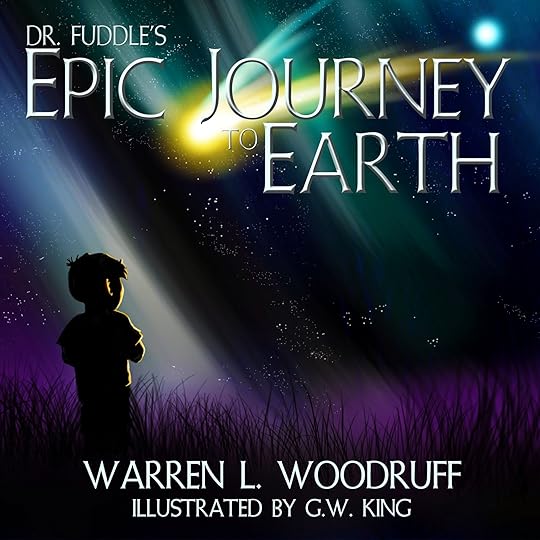Kenneth Atchity's Blog, page 171
April 16, 2015
Guest Post: Op-Ed: History is not a Strong Point with the Young in America
"The Last Witness" is a book about the last Holocaust survivor. Do not take it for granted that the younger generation - those who did not get a Jewish education, that is - knows what that means.
 Novelists must learn to deal with rejection. We get rejected all the time and receive replies like “This does not fit in with our current editorial needs.” But when a publisher turns down a novel because “I found that I had to suspend disbelief,” as one of them told my literary agent, that is another thing.
Novelists must learn to deal with rejection. We get rejected all the time and receive replies like “This does not fit in with our current editorial needs.” But when a publisher turns down a novel because “I found that I had to suspend disbelief,” as one of them told my literary agent, that is another thing.
For years I had an idea – a novel about the last living survivor of the Holocaust. The man would be 100 years old. He would have been a child survivor, so after working out the details and doing the math, I pegged his birth to the year 1939. When he is 100 years old we are in 2039, the near future, and that’s when my story in The Last Witness takes place. But there’s a hook. My character is living at a time when knowledge of the Holocaust is pretty meager, and that was the problem this publisher had; he couldn’t buy my premise that one generation from now ignorance of the Holocaust would be widespread.
The novel includes flashbacks about my survivor as a hidden child in a Jewish ghetto, and then being discovered and winding up at Auschwitz with his family. He is the only one who gets out.
Edmund Burke said those who don’t know history are doomed to repeat it, and this is what is so frightening about the current generation. Indeed, their lack of knowledge about times past is an epidemic of dire proportions.
Poll after poll has shown that young people are abysmally ignorant where history is concerned.
I have seen this first-hand. I used to teach writing and journalism to college students; there were those right out of high school and those with university degrees. One thing I learned early on was that history is not a forte with the young, and unless they had attended religious school as children, they also weren’t up to snuff on the most basic biblical analogies. It meant no jokes about living as long as Methuselah. No references to the
One student said that “thousands” of Jews had been killed in the Holocaust, and another said that while he’s heard of the Holocaust, he couldn’t explain it.
One student said that “thousands” of Jews had been killed in the Holocaust, and another said that while he’s heard of the Holocaust, he couldn’t explain it.
parting of the Red Sea. Nothing about David and Goliath or the Three Wise Men.
Have you ever played Trivial Pursuit with someone under 35 and asked questions in the History category? It’s incredible what they don’t know.
After getting the rejection from that publisher, I decided to produce a video. We went out to ask university students in Toronto, where I live, what they know about the Holocaust.
“When did the Holocaust take place?” I asked the first two I encountered.
The two girls stared at each other. Hmm. One of them said, “Nineteen-eighty …” but she wasn’t sure. Then her friend said it wasn’t the 1980s. They looked at each other again. “Nineteen-forty?” they said as one voice.
I asked the next pair, a young man and woman, if they have ever heard of The Final Solution. No they hadn’t. As it turned out, they weren’t up to snuff on D-Day, the Beaches of Normandy, FDR or Churchill either.
Not one student I spoke to that afternoon could tell me who Josef Mengele was. One student said that “thousands” of Jews had been killed in the Holocaust, and another said that while he’s heard of the Holocaust, he couldn’t explain it.
I don’t blame the students for knowing so little about history. When I was their age I might have been in the same boat, except history was compulsory then. But that isn’t the case today, which is why these students were scratching their heads searching for a tidbit of information about the Holocaust or Churchill.
Novelists must learn to deal with rejection. We get rejected all the time and receive replies like “This does not fit in with our current editorial needs.” But when a publisher turns down a novel because “I found that I had to suspend disbelief,” as one of them told my literary agent, that is another thing.
For years I had an idea – a novel about the last living survivor of the Holocaust. The man would be 100 years old. He would have been a child survivor, so after working out the details and doing the math, I pegged his birth to the year 1939. When he is 100 years old we are in 2039, the near future, and that’s when my story in The Last Witness takes place. But there’s a hook. My character is living at a time when knowledge of the Holocaust is pretty meager, and that was the problem this publisher had; he couldn’t buy my premise that one generation from now ignorance of the Holocaust would be widespread.
The novel includes flashbacks about my survivor as a hidden child in a Jewish ghetto, and then being discovered and winding up at Auschwitz with his family. He is the only one who gets out.
Edmund Burke said those who don’t know history are doomed to repeat it, and this is what is so frightening about the current generation. Indeed, their lack of knowledge about times past is an epidemic of dire proportions.
Poll after poll has shown that young people are abysmally ignorant where history is concerned.
I have seen this first-hand. I used to teach writing and journalism to college students; there were those right out of high school and those with university degrees. One thing I learned early on was that history is not a forte with the young, and unless they had attended religious school as children, they also weren’t up to snuff on the most basic biblical analogies. It meant no jokes about living as long as Methuselah. No references to the parting of the Red Sea. Nothing about David and Goliath or the Three Wise Men.
Have you ever played Trivial Pursuit with someone under 35 and asked questions in the History category? It’s incredible what they don’t know.
After getting the rejection from that publisher, I decided to produce a video. We went out to ask university students in Toronto, where I live, what they know about the Holocaust.
“When did the Holocaust take place?” I asked the first two I encountered.
The two girls stared at each other. Hmm. One of them said, “Nineteen-eighty …” but she wasn’t sure. Then her friend said it wasn’t the 1980s. They looked at each other again. “Nineteen-forty?” they said as one voice.
I asked the next pair, a young man and woman, if they have ever heard of The Final Solution. No they hadn’t. As it turned out, they weren’t up to snuff on D-Day, the Beaches of Normandy, FDR or Churchill either.
Not one student I spoke to that afternoon could tell me who Josef Mengele was. One student said that “thousands” of Jews had been killed in the Holocaust, and another said that while he’s heard of the Holocaust, he couldn’t explain it.
I don’t blame the students for knowing so little about history. When I was their age I might have been in the same boat, except history was compulsory then. But that isn’t the case today, which is why these students were scratching their heads searching for a tidbit of information about the Holocaust or Churchill.
The Last Witness is fiction, but a lot of research went into it. I met with former child survivors and Sir Martin Gilbert, the eminent historian and master chronicler of the Holocaust who passed away recently. Gilbert and all those former child survivors had no trouble accepting my premise that knowledge of the Holocaust is lagging and will only get worse in the future.
Should we be concerned? Yes. Today we have a rising Cold War with Russia and a cauldron in the Middle East, never mind far-right political parties getting scary levels of support in many European countries. Hate seems to be everywhere.
With all this in mind, I recently took out a book from the library – Jewish Power: Inside the American Jewish Establishment by respected journalist J. J. Goldberg. The book was a thoughtful, well-researched exploration of the history of Jews in America, the Israel lobby, and what impact Jews may have in certain areas. Goldberg, of course, is Jewish himself. But when I got home I saw, scribbled in pencil on the first blank page just inside the cover, this handwritten message:
‘We hate jews because we know that judaism is not simply another religion but the ideology of class/racial exclusivity apartheid and supremacism and they succeed in imposing their will on the rest of us. Simply put we hate jews because jews hate and control us.’
I was mortified. The message wasn’t signed – bigots are not known for their courage – and I’m sure whoever wrote it didn’t read the book. What is likely is that the person saw the title Jewish Power and thought this was about Jews taking over the world – the so-called Protocols of the Elders of Zion, a myth created in Russia in 1903 and which to this day seeps into the consciousness of those who think they have it all figured out.
After finishing the book, I returned to the library and told the librarian there was an offensive message inside. She promised to address the matter. As for the cretin who wrote it, I can only say this: one thing I know about the human condition is that the greatest crimes in history are due to ignorance. That, of course, brings up our friend Edmund Burke again. But is anyone listening?
Reposted from Israel National News
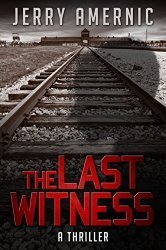
The year is 2039, and Jack Fisher is the last living survivor of the Holocaust. Set in a world that is abysmally ignorant and complacent about events of the last century, Jack is a 100-year-old man whose worst memories took place before he was 5. His story hearkens back to the Jewish ghetto of his birth and to Auschwitz where, as a little boy, he had to fend for himself to survive after losing all his family. Jack becomes the central figure in a missing-person investigation when his granddaughter suddenly disappears. While assisting police, he finds himself in danger and must reach into the darkest corners of his memory to come out alive.
The Last Witness on Amazon - See more at: http://www.kenatchityblog.com/search?...
 The year is 2039, and Jack Fisher is the last living survivor of the Holocaust. Set in a world that is abysmally complacent about events of the last century, Jack is a 100-year-old man whose worst memories took place before he was 5. His story hearkens back to the Jewish ghetto of his birth and to Auschwitz where, as a little boy, he had to fend for himself to survive after losing his family. Jack becomes the central figure in a missing-person investigation when his granddaughter suddenly disappears. While assisting police, he finds himself in danger and must reach into the darkest corners of his memory to come out alive.
The year is 2039, and Jack Fisher is the last living survivor of the Holocaust. Set in a world that is abysmally complacent about events of the last century, Jack is a 100-year-old man whose worst memories took place before he was 5. His story hearkens back to the Jewish ghetto of his birth and to Auschwitz where, as a little boy, he had to fend for himself to survive after losing his family. Jack becomes the central figure in a missing-person investigation when his granddaughter suddenly disappears. While assisting police, he finds himself in danger and must reach into the darkest corners of his memory to come out alive.
Available on Amazon

 Novelists must learn to deal with rejection. We get rejected all the time and receive replies like “This does not fit in with our current editorial needs.” But when a publisher turns down a novel because “I found that I had to suspend disbelief,” as one of them told my literary agent, that is another thing.
Novelists must learn to deal with rejection. We get rejected all the time and receive replies like “This does not fit in with our current editorial needs.” But when a publisher turns down a novel because “I found that I had to suspend disbelief,” as one of them told my literary agent, that is another thing.For years I had an idea – a novel about the last living survivor of the Holocaust. The man would be 100 years old. He would have been a child survivor, so after working out the details and doing the math, I pegged his birth to the year 1939. When he is 100 years old we are in 2039, the near future, and that’s when my story in The Last Witness takes place. But there’s a hook. My character is living at a time when knowledge of the Holocaust is pretty meager, and that was the problem this publisher had; he couldn’t buy my premise that one generation from now ignorance of the Holocaust would be widespread.
The novel includes flashbacks about my survivor as a hidden child in a Jewish ghetto, and then being discovered and winding up at Auschwitz with his family. He is the only one who gets out.
Edmund Burke said those who don’t know history are doomed to repeat it, and this is what is so frightening about the current generation. Indeed, their lack of knowledge about times past is an epidemic of dire proportions.
Poll after poll has shown that young people are abysmally ignorant where history is concerned.
I have seen this first-hand. I used to teach writing and journalism to college students; there were those right out of high school and those with university degrees. One thing I learned early on was that history is not a forte with the young, and unless they had attended religious school as children, they also weren’t up to snuff on the most basic biblical analogies. It meant no jokes about living as long as Methuselah. No references to the
One student said that “thousands” of Jews had been killed in the Holocaust, and another said that while he’s heard of the Holocaust, he couldn’t explain it.
One student said that “thousands” of Jews had been killed in the Holocaust, and another said that while he’s heard of the Holocaust, he couldn’t explain it.
parting of the Red Sea. Nothing about David and Goliath or the Three Wise Men.
Have you ever played Trivial Pursuit with someone under 35 and asked questions in the History category? It’s incredible what they don’t know.
After getting the rejection from that publisher, I decided to produce a video. We went out to ask university students in Toronto, where I live, what they know about the Holocaust.
“When did the Holocaust take place?” I asked the first two I encountered.
The two girls stared at each other. Hmm. One of them said, “Nineteen-eighty …” but she wasn’t sure. Then her friend said it wasn’t the 1980s. They looked at each other again. “Nineteen-forty?” they said as one voice.
I asked the next pair, a young man and woman, if they have ever heard of The Final Solution. No they hadn’t. As it turned out, they weren’t up to snuff on D-Day, the Beaches of Normandy, FDR or Churchill either.
Not one student I spoke to that afternoon could tell me who Josef Mengele was. One student said that “thousands” of Jews had been killed in the Holocaust, and another said that while he’s heard of the Holocaust, he couldn’t explain it.
I don’t blame the students for knowing so little about history. When I was their age I might have been in the same boat, except history was compulsory then. But that isn’t the case today, which is why these students were scratching their heads searching for a tidbit of information about the Holocaust or Churchill.
Novelists must learn to deal with rejection. We get rejected all the time and receive replies like “This does not fit in with our current editorial needs.” But when a publisher turns down a novel because “I found that I had to suspend disbelief,” as one of them told my literary agent, that is another thing.
For years I had an idea – a novel about the last living survivor of the Holocaust. The man would be 100 years old. He would have been a child survivor, so after working out the details and doing the math, I pegged his birth to the year 1939. When he is 100 years old we are in 2039, the near future, and that’s when my story in The Last Witness takes place. But there’s a hook. My character is living at a time when knowledge of the Holocaust is pretty meager, and that was the problem this publisher had; he couldn’t buy my premise that one generation from now ignorance of the Holocaust would be widespread.
The novel includes flashbacks about my survivor as a hidden child in a Jewish ghetto, and then being discovered and winding up at Auschwitz with his family. He is the only one who gets out.
Edmund Burke said those who don’t know history are doomed to repeat it, and this is what is so frightening about the current generation. Indeed, their lack of knowledge about times past is an epidemic of dire proportions.
Poll after poll has shown that young people are abysmally ignorant where history is concerned.
I have seen this first-hand. I used to teach writing and journalism to college students; there were those right out of high school and those with university degrees. One thing I learned early on was that history is not a forte with the young, and unless they had attended religious school as children, they also weren’t up to snuff on the most basic biblical analogies. It meant no jokes about living as long as Methuselah. No references to the parting of the Red Sea. Nothing about David and Goliath or the Three Wise Men.
Have you ever played Trivial Pursuit with someone under 35 and asked questions in the History category? It’s incredible what they don’t know.
After getting the rejection from that publisher, I decided to produce a video. We went out to ask university students in Toronto, where I live, what they know about the Holocaust.
“When did the Holocaust take place?” I asked the first two I encountered.
The two girls stared at each other. Hmm. One of them said, “Nineteen-eighty …” but she wasn’t sure. Then her friend said it wasn’t the 1980s. They looked at each other again. “Nineteen-forty?” they said as one voice.
I asked the next pair, a young man and woman, if they have ever heard of The Final Solution. No they hadn’t. As it turned out, they weren’t up to snuff on D-Day, the Beaches of Normandy, FDR or Churchill either.
Not one student I spoke to that afternoon could tell me who Josef Mengele was. One student said that “thousands” of Jews had been killed in the Holocaust, and another said that while he’s heard of the Holocaust, he couldn’t explain it.
I don’t blame the students for knowing so little about history. When I was their age I might have been in the same boat, except history was compulsory then. But that isn’t the case today, which is why these students were scratching their heads searching for a tidbit of information about the Holocaust or Churchill.
The Last Witness is fiction, but a lot of research went into it. I met with former child survivors and Sir Martin Gilbert, the eminent historian and master chronicler of the Holocaust who passed away recently. Gilbert and all those former child survivors had no trouble accepting my premise that knowledge of the Holocaust is lagging and will only get worse in the future.
Should we be concerned? Yes. Today we have a rising Cold War with Russia and a cauldron in the Middle East, never mind far-right political parties getting scary levels of support in many European countries. Hate seems to be everywhere.
With all this in mind, I recently took out a book from the library – Jewish Power: Inside the American Jewish Establishment by respected journalist J. J. Goldberg. The book was a thoughtful, well-researched exploration of the history of Jews in America, the Israel lobby, and what impact Jews may have in certain areas. Goldberg, of course, is Jewish himself. But when I got home I saw, scribbled in pencil on the first blank page just inside the cover, this handwritten message:
‘We hate jews because we know that judaism is not simply another religion but the ideology of class/racial exclusivity apartheid and supremacism and they succeed in imposing their will on the rest of us. Simply put we hate jews because jews hate and control us.’
I was mortified. The message wasn’t signed – bigots are not known for their courage – and I’m sure whoever wrote it didn’t read the book. What is likely is that the person saw the title Jewish Power and thought this was about Jews taking over the world – the so-called Protocols of the Elders of Zion, a myth created in Russia in 1903 and which to this day seeps into the consciousness of those who think they have it all figured out.
After finishing the book, I returned to the library and told the librarian there was an offensive message inside. She promised to address the matter. As for the cretin who wrote it, I can only say this: one thing I know about the human condition is that the greatest crimes in history are due to ignorance. That, of course, brings up our friend Edmund Burke again. But is anyone listening?
Reposted from Israel National News

The year is 2039, and Jack Fisher is the last living survivor of the Holocaust. Set in a world that is abysmally ignorant and complacent about events of the last century, Jack is a 100-year-old man whose worst memories took place before he was 5. His story hearkens back to the Jewish ghetto of his birth and to Auschwitz where, as a little boy, he had to fend for himself to survive after losing all his family. Jack becomes the central figure in a missing-person investigation when his granddaughter suddenly disappears. While assisting police, he finds himself in danger and must reach into the darkest corners of his memory to come out alive.
The Last Witness on Amazon - See more at: http://www.kenatchityblog.com/search?...
 The year is 2039, and Jack Fisher is the last living survivor of the Holocaust. Set in a world that is abysmally complacent about events of the last century, Jack is a 100-year-old man whose worst memories took place before he was 5. His story hearkens back to the Jewish ghetto of his birth and to Auschwitz where, as a little boy, he had to fend for himself to survive after losing his family. Jack becomes the central figure in a missing-person investigation when his granddaughter suddenly disappears. While assisting police, he finds himself in danger and must reach into the darkest corners of his memory to come out alive.
The year is 2039, and Jack Fisher is the last living survivor of the Holocaust. Set in a world that is abysmally complacent about events of the last century, Jack is a 100-year-old man whose worst memories took place before he was 5. His story hearkens back to the Jewish ghetto of his birth and to Auschwitz where, as a little boy, he had to fend for himself to survive after losing his family. Jack becomes the central figure in a missing-person investigation when his granddaughter suddenly disappears. While assisting police, he finds himself in danger and must reach into the darkest corners of his memory to come out alive.Available on Amazon

Published on April 16, 2015 00:00
April 15, 2015
Story Merchant Books: FREE E-Book Deals on Amazon
Published on April 15, 2015 00:00
April 9, 2015
Guest Post: Iran and Nuclear Technology by Dan Turello
The Details Matter -- But Even More Important Is the Long View of History 
We will be hearing all manner of opinion about the particulars of the recently brokered deal with Iran. In the midst of them, we should remember that behind the nuances of current strategy lies an important philosophical question that has hounded political theorists for a long time: that is the relationship between "might" and "right" and what may happen when allegedly less evolved civilizations gain access to technology that allows them to threaten other nations.
Among the philosophers who have dealt with this question, Giambattista Vico (1668-1744) deserves particular attention. Vico's life was a case-study in perseverance. His day-to-day existence was full of trials. He fell off a ladder in his youth and had severe learning problems. Bookish and serious, he studied law, Latin, and rhetoric. At various points in his career he was so poor he wrote eulogies to supplement his income. He aspired to be a law professor, but that faculty snubbed him, so he toiled at a much less prestigious post in rhetoric at the University of Naples, Italy. All the while, he puzzled about some of the most complex problems in politics and philosophy and penned a number of major volumes. Mostly ignored during his lifetime, he gained popularity after his death, and is rightly remembered today for his magnum opus, Principj di una scienza nuova intorno alla natura delle nazioni, or New Science, as it is rendered in English translation, as well as earlier works of philosophy and history that attempted to offer a comprehensive explanation of the rise and fall of nations.
Reading the pages of Vico's early 18th century writings makes the Iran debates seem like a deja-vu. In the three centuries prior to Vico's time, the Ottoman Empire had secured a wide sphere of influence, and had posed an ongoing threat to the Christian West. Commentators had been in a quandary about how to interpret this. The Ottomans were generally considered retrograde, and their civilization deemed less moral. Yet, they had managed to acquire and develop military technology that made them a threat.
Reflecting on this period of history, one of Vico's conclusions was that the Ottoman's success was in part the result of Christian traitors -- advisers who were selling their military wisdom to enemies of the state. But what is most important about Vico's thinking is that he correctly came to the conclusion that beyond the nuances of any particular moment in history, technological mastery and military superiority were ultimately linked to the long-term quality of a country's cultural investments. Supremacy in military power, he thought, was the result of the superior flourishing of the arts and letters -- in other words, those habits of mind that lead to robust curiosity, free debate, and restless searching, scientific and otherwise. Given these virtues and ongoing investments, he believed a nation's military superiority and ability to defend itself could be preserved over time.
While pursuing a spirited debate about if and how to engage with Iran is important, even more significant to the long term health and vitality of the United States is to remember, along with Vico, that first and foremost we must continue to support those habits of culture that have made the United States strong in the first place. This means sustaining large investments in basic and applied science, in education at every level, in the arts and letters -- all areas that will ensure robust inquiry and the country's long-term vitality. If we persevere with these investments, we may continue to wield influence in world affairs in the decades to come. We will also give ourselves reason to continue being proud of the values we seek to defend.
This perspective has an added benefit. It points the way towards a nuanced stance that embraces patriotic support for the values and aspirations embedded in the American experience while recognizing that global leadership is not about manifest destiny, providence, a once-and-for-all position of rightness vis-à-vis the rest of the world, or any other such wishful thinking. It's about an ongoing attention to the values and investments that make us strong, and noble, over the long term.
Follow Dan Turello on Twitter: www.twitter.com/danturello

Dan Turello grew up in the Piedmont region of Italy, served in the Italian Alpine Troops and completed a Ph.D. at Harvard. Whether it’s engineering in the Renaissance or sci-fi and information networks today, most of his writing comes back to themes of “earth-tones” and “green.” He has published articles and reviews in the Washington Post, Renaissance Studies, Rassegna dell’Esercito, The Romance Sphere, and Italian Studies. Reposted From The Huffington Post

We will be hearing all manner of opinion about the particulars of the recently brokered deal with Iran. In the midst of them, we should remember that behind the nuances of current strategy lies an important philosophical question that has hounded political theorists for a long time: that is the relationship between "might" and "right" and what may happen when allegedly less evolved civilizations gain access to technology that allows them to threaten other nations.
Among the philosophers who have dealt with this question, Giambattista Vico (1668-1744) deserves particular attention. Vico's life was a case-study in perseverance. His day-to-day existence was full of trials. He fell off a ladder in his youth and had severe learning problems. Bookish and serious, he studied law, Latin, and rhetoric. At various points in his career he was so poor he wrote eulogies to supplement his income. He aspired to be a law professor, but that faculty snubbed him, so he toiled at a much less prestigious post in rhetoric at the University of Naples, Italy. All the while, he puzzled about some of the most complex problems in politics and philosophy and penned a number of major volumes. Mostly ignored during his lifetime, he gained popularity after his death, and is rightly remembered today for his magnum opus, Principj di una scienza nuova intorno alla natura delle nazioni, or New Science, as it is rendered in English translation, as well as earlier works of philosophy and history that attempted to offer a comprehensive explanation of the rise and fall of nations.
Reading the pages of Vico's early 18th century writings makes the Iran debates seem like a deja-vu. In the three centuries prior to Vico's time, the Ottoman Empire had secured a wide sphere of influence, and had posed an ongoing threat to the Christian West. Commentators had been in a quandary about how to interpret this. The Ottomans were generally considered retrograde, and their civilization deemed less moral. Yet, they had managed to acquire and develop military technology that made them a threat.
Reflecting on this period of history, one of Vico's conclusions was that the Ottoman's success was in part the result of Christian traitors -- advisers who were selling their military wisdom to enemies of the state. But what is most important about Vico's thinking is that he correctly came to the conclusion that beyond the nuances of any particular moment in history, technological mastery and military superiority were ultimately linked to the long-term quality of a country's cultural investments. Supremacy in military power, he thought, was the result of the superior flourishing of the arts and letters -- in other words, those habits of mind that lead to robust curiosity, free debate, and restless searching, scientific and otherwise. Given these virtues and ongoing investments, he believed a nation's military superiority and ability to defend itself could be preserved over time.
While pursuing a spirited debate about if and how to engage with Iran is important, even more significant to the long term health and vitality of the United States is to remember, along with Vico, that first and foremost we must continue to support those habits of culture that have made the United States strong in the first place. This means sustaining large investments in basic and applied science, in education at every level, in the arts and letters -- all areas that will ensure robust inquiry and the country's long-term vitality. If we persevere with these investments, we may continue to wield influence in world affairs in the decades to come. We will also give ourselves reason to continue being proud of the values we seek to defend.
This perspective has an added benefit. It points the way towards a nuanced stance that embraces patriotic support for the values and aspirations embedded in the American experience while recognizing that global leadership is not about manifest destiny, providence, a once-and-for-all position of rightness vis-à-vis the rest of the world, or any other such wishful thinking. It's about an ongoing attention to the values and investments that make us strong, and noble, over the long term.
Follow Dan Turello on Twitter: www.twitter.com/danturello

Dan Turello grew up in the Piedmont region of Italy, served in the Italian Alpine Troops and completed a Ph.D. at Harvard. Whether it’s engineering in the Renaissance or sci-fi and information networks today, most of his writing comes back to themes of “earth-tones” and “green.” He has published articles and reviews in the Washington Post, Renaissance Studies, Rassegna dell’Esercito, The Romance Sphere, and Italian Studies. Reposted From The Huffington Post

Published on April 09, 2015 00:00
April 4, 2015
Guest Post: Should You Write With a Partner? by Dennis Palumbo
Writing partnerships: the Good, the Bad, and the Ugly Hollywood on the CouchThe inside scoop on Tinseltown, USA.
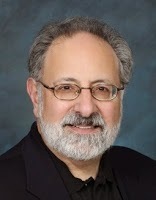 Now and again a screen or TV writer patient of mine wrestles with the idea of taking on a writing partner. Having done dozens of therapy sessions with writing teams over the years—plus having begun my former career in Hollywood as half of a sitcom-writing partnership—I have more than a few thoughts about the potential benefits, liabilities and turmoil of doing so. Let’s call these (with apologies to Sergio Leone) the Good, the Bad and the Ugly.
Now and again a screen or TV writer patient of mine wrestles with the idea of taking on a writing partner. Having done dozens of therapy sessions with writing teams over the years—plus having begun my former career in Hollywood as half of a sitcom-writing partnership—I have more than a few thoughts about the potential benefits, liabilities and turmoil of doing so. Let’s call these (with apologies to Sergio Leone) the Good, the Bad and the Ugly.
The Good: The obvious benefits of a writing partner can be reduced down to the familiar adage, “Two heads are better than one.” With a partner you have the advantage of a sounding board for your ideas, a straight man (or woman) for your jokes, and a life-raft when your inspiration is sinking.
A partner brings less obvious benefits, as well. If you’re prone to procrastination, just knowing that your partner is waiting impatiently for you to join in will help motivate you. A writing partner can pull the two of you up when you’re feeling down. Moreover, when pitching a story to a producer or studio exec, your memory might suddenly flag, or you’ll get the narrative elements out of order, and panic sets in. In which case, a good writing partner can step up and pinch-hit for you. (It helps, too, when a pitch goes badly to have someone with whom to commiserate over beers at the inevitable post-mortem.)
Finally, a writing partner can be the obvious solution to a well-known downside to the profession: It can be lonely. For many TV and film writers I know, taking on a partner rescued them from an experience of loneliness that, after a number of years, had grown literally intolerable.
Next up, the Bad: For just as many writers I know, the thought of having to compromise their vision, negotiate scenes and dialogue, and split credit (and fees) is equally intolerable. The inverse of the loneliness to which writers often succumb is the sublime privacy and freedom from interference that a solo writer enjoys. “It’s bad enough,” one of my patients told me, “to have to take notes from agents, producers, directors and actors. But having to take them from a writing partner is maddening.” This patient, as you may have guessed, had worked with a partner for years before going her own way.
Which brings up another dilemma that plagues writing partnerships: how you’re each perceived in the marketplace. Is one of you considered the more talented, funnier, easier to get along with? Within the partnership itself, is the division of labor fair, effective, logical? And who decides these concerns? Which of the two of you assumes the role of team spokesperson, agent liaison, the one who has the star’s ear on set?
And, lastly, what happens when the two writers grow in different directions? When, for example, one has ambitions to write dramatic film or TV scripts, while the other prefers to stay in comedy? When one writer wants to try his or her hand at a novel or play? Or decides to go on a three-month spiritual retreat? What does the partner do, sit around and wait? Or start looking for a new partner?
Which brings me, regrettably, to the aspect of writing partnerships that I’ve dubbed the Ugly: As I mentioned up front, I do see writing teams in my therapy practice, and usually for the same reason I see romantic couples—issues involving money, communication, power, jealousy and fear of abandonment.
As in any long-term relationship, a writing partnership creates an environment in which old interpersonal and intimacy issues emerge. Issues that existed long before you joined up as a team. Think about it. If the tools of communication are poor in other areas of your life, what makes you think you’ll deal with a writing partner in more effective ways? If you’re prone to envy, let’s say, this will prove to be true in the partnership as well. If, to avoid conflict, you surrender your own needs and beliefs in your other relationships, you’re likely to do the same in your writing partnership.
As I’ve seen in my office, these problems can become especially painful if the writing team is successful. Like the unhappy couple that stays together “for the sake of the children,” there are writing partners that stay together to maintain their level of professional success. “I can’t afford to get a divorce,” I’ve heard many a husband or wife say privately to me. I’ve heard many a member of a writing team tell me the same thing.
Now here’s the good news: As with most couples, the issues disrupting a writing partnership can usually be addressed and worked through if each of the writers is willing. However, as any therapist who does couples counseling will attest, there’s no one blueprint for achieving effective communication and fostering intimacy; each relationship, ultimately, is a mystery. The same is true for writing partnerships. Even productive, successful ones. Some days are good, some are bad, and some are just plain ugly.
Like with most things in life, the pleasures and pains of writing with a partner are particular to each writer and a function of that writer’s temperament. In other words, the more you know yourself, the better you’ll be able to decide if writing with a partner is right for you.
Good luck.
----------------------------------------------------
A former Hollywood screenwriter, Dennis Palumbo is now a licensed psychotherapist in private practice, as well as the author of the Daniel Rinaldi series of mysteries. For more info, please visit www.dennispalumbo.com (link is external)
Reposted From Psychology Today

 Now and again a screen or TV writer patient of mine wrestles with the idea of taking on a writing partner. Having done dozens of therapy sessions with writing teams over the years—plus having begun my former career in Hollywood as half of a sitcom-writing partnership—I have more than a few thoughts about the potential benefits, liabilities and turmoil of doing so. Let’s call these (with apologies to Sergio Leone) the Good, the Bad and the Ugly.
Now and again a screen or TV writer patient of mine wrestles with the idea of taking on a writing partner. Having done dozens of therapy sessions with writing teams over the years—plus having begun my former career in Hollywood as half of a sitcom-writing partnership—I have more than a few thoughts about the potential benefits, liabilities and turmoil of doing so. Let’s call these (with apologies to Sergio Leone) the Good, the Bad and the Ugly.The Good: The obvious benefits of a writing partner can be reduced down to the familiar adage, “Two heads are better than one.” With a partner you have the advantage of a sounding board for your ideas, a straight man (or woman) for your jokes, and a life-raft when your inspiration is sinking.
A partner brings less obvious benefits, as well. If you’re prone to procrastination, just knowing that your partner is waiting impatiently for you to join in will help motivate you. A writing partner can pull the two of you up when you’re feeling down. Moreover, when pitching a story to a producer or studio exec, your memory might suddenly flag, or you’ll get the narrative elements out of order, and panic sets in. In which case, a good writing partner can step up and pinch-hit for you. (It helps, too, when a pitch goes badly to have someone with whom to commiserate over beers at the inevitable post-mortem.)
Finally, a writing partner can be the obvious solution to a well-known downside to the profession: It can be lonely. For many TV and film writers I know, taking on a partner rescued them from an experience of loneliness that, after a number of years, had grown literally intolerable.
Next up, the Bad: For just as many writers I know, the thought of having to compromise their vision, negotiate scenes and dialogue, and split credit (and fees) is equally intolerable. The inverse of the loneliness to which writers often succumb is the sublime privacy and freedom from interference that a solo writer enjoys. “It’s bad enough,” one of my patients told me, “to have to take notes from agents, producers, directors and actors. But having to take them from a writing partner is maddening.” This patient, as you may have guessed, had worked with a partner for years before going her own way.
Which brings up another dilemma that plagues writing partnerships: how you’re each perceived in the marketplace. Is one of you considered the more talented, funnier, easier to get along with? Within the partnership itself, is the division of labor fair, effective, logical? And who decides these concerns? Which of the two of you assumes the role of team spokesperson, agent liaison, the one who has the star’s ear on set?
And, lastly, what happens when the two writers grow in different directions? When, for example, one has ambitions to write dramatic film or TV scripts, while the other prefers to stay in comedy? When one writer wants to try his or her hand at a novel or play? Or decides to go on a three-month spiritual retreat? What does the partner do, sit around and wait? Or start looking for a new partner?
Which brings me, regrettably, to the aspect of writing partnerships that I’ve dubbed the Ugly: As I mentioned up front, I do see writing teams in my therapy practice, and usually for the same reason I see romantic couples—issues involving money, communication, power, jealousy and fear of abandonment.
As in any long-term relationship, a writing partnership creates an environment in which old interpersonal and intimacy issues emerge. Issues that existed long before you joined up as a team. Think about it. If the tools of communication are poor in other areas of your life, what makes you think you’ll deal with a writing partner in more effective ways? If you’re prone to envy, let’s say, this will prove to be true in the partnership as well. If, to avoid conflict, you surrender your own needs and beliefs in your other relationships, you’re likely to do the same in your writing partnership.
As I’ve seen in my office, these problems can become especially painful if the writing team is successful. Like the unhappy couple that stays together “for the sake of the children,” there are writing partners that stay together to maintain their level of professional success. “I can’t afford to get a divorce,” I’ve heard many a husband or wife say privately to me. I’ve heard many a member of a writing team tell me the same thing.
Now here’s the good news: As with most couples, the issues disrupting a writing partnership can usually be addressed and worked through if each of the writers is willing. However, as any therapist who does couples counseling will attest, there’s no one blueprint for achieving effective communication and fostering intimacy; each relationship, ultimately, is a mystery. The same is true for writing partnerships. Even productive, successful ones. Some days are good, some are bad, and some are just plain ugly.
Like with most things in life, the pleasures and pains of writing with a partner are particular to each writer and a function of that writer’s temperament. In other words, the more you know yourself, the better you’ll be able to decide if writing with a partner is right for you.
Good luck.
----------------------------------------------------
A former Hollywood screenwriter, Dennis Palumbo is now a licensed psychotherapist in private practice, as well as the author of the Daniel Rinaldi series of mysteries. For more info, please visit www.dennispalumbo.com (link is external)
Reposted From Psychology Today
Published on April 04, 2015 00:00
April 2, 2015
T.M. Bown's Lost Oasis FREE April 3 - 7 on Amazon !!
Published on April 02, 2015 14:34
March 23, 2015
'Phantom Limb': A Conversation With Dennis Palumbo

Photo: Nathanson's Photography
Dennis Palumbo is a thriller writer and psychotherapist in private practice. He's the author of the non-fiction book, Writing from the Inside Out and a collection of mystery stories, From Crime to Crime. He has also been writing the Daniel Rinaldi mystery series. He was formerly a Hollywood screenwriter, whose credits include the film My Favorite Year, which was nominated for a Writers Guild of America Award for Best Screenplay. He was a staff writer for the TV series Welcome Back, Kotter. Currently, he blogs for the Huffington Post and has a column, Hollywood on the Couch, for Psychology Today.
His mystery-thriller series concerns Dr. Daniel Rinaldi, a psychologist and trauma expert, who consults with the
Pittsburg Police. His specialty is treating victims of violent crime who suffer from the traumatic after-effects of those experiences. Rinaldi suffered such a trauma when his wife was killed during a mugging. Though he too was shot, he lived, but struggled with survivor's guilt long afterwards. Now, his mission now is to help others deal with their trauma symptoms, but in the process, he manages to get heavily involved in police investigations, often to the consternation of his police colleagues.
In Phantom Limb, the fourth book in the series, Dr. Rinaldi consults with a prospective patient, a woman he last
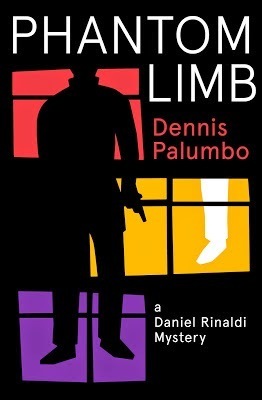 saw thirty years ago in Playboy. Lisa Campbell, ex-starlet and current trophy wife of elderly tycoon Charles Harland, plans to kill herself at 7 o'clock that evening. Daniel has only fifty minutes, the length of their session, to talk her out of it. Soon after Lisa leaves his office, she's kidnapped. As a psychologist who may have heard critical information, he's ethically bound not to share what they discussed. So, Rinaldi must navigate tricky waters to help the police locate Lisa. Rinaldi find himself amid a tangled web of kidnapping, murder, sexual deviance, and family secrets.
saw thirty years ago in Playboy. Lisa Campbell, ex-starlet and current trophy wife of elderly tycoon Charles Harland, plans to kill herself at 7 o'clock that evening. Daniel has only fifty minutes, the length of their session, to talk her out of it. Soon after Lisa leaves his office, she's kidnapped. As a psychologist who may have heard critical information, he's ethically bound not to share what they discussed. So, Rinaldi must navigate tricky waters to help the police locate Lisa. Rinaldi find himself amid a tangled web of kidnapping, murder, sexual deviance, and family secrets.It seems in some respects, Daniel Rinaldi bears a resemblance to you. True?
He does, in the sense we're both born and raised in Pittsburgh. We both went to Pitt. We're both Italian-Americans and the big similarity other than we're both psychologists, is we straddle the Pittsburgh of old and new. When I went to college, the city was loaded with steel mills. They're all gone now. Industrial Pittsburgh has been replaced by a high-tech, sophisticated city. Daniel and I are very aware of that change, from a formerly dingy city, with its skies filled with smoke and ash, and coal barges going up and down the Allegheny River, to what it is now: a city with gleaming skyscrapers and clean air.

Daniel is also some things I'm not: he's a former amateur boxer; he's brave and resourceful, which I'm not (Laughter). The things he gets involved with would have me running in the other direction. Kirkus Reviews called him 'Jack Reacher with a psychology degree.' (More laughter).
As a psychotherapist yourself, how much of your training do you bring to the Daniel Rinaldi novels?
I've been a licensed therapist for almost twenty-eight years. For three-and-half years, I worked in a psychiatric hospital with schizophrenics. Earlier in my career, I spent five years in training on trauma theory with the nation's leading trauma expert, Dr. Robert Stolorow. That's one of the reasons I made Daniel a trauma expert. In most thriller novels, the effects of trauma on crime victims are never dealt with. In the Daniel Rinaldi series, these effects are very important. That's part of what my training as a psychologist brings to the writing.
The Daniel Rinaldi novels are written from the first-person perspective. What are the advantages of this style?
For me, the advantage is we get to be inside Daniel's head and thoughts. From that perspective, we really hear his voice. Rather than hearing a removed, third-person authorial voice, we get to stay within Daniel himself; we're inside his head. So, not only will he say something to another character, but he'll also think something to himself, something to which the reader is privy. We get a solid sense of who he is. I also like that by using the first person, the reader only knows what Daniel knows. Often, in thrillers, the reader knows what the bad guy is thinking. So, from a first person perspective, it's a bit more difficult to build suspense, but I'm able to do it. I construct the story so enough dread is foreshadowed to make the reader worry for Daniel.
You've been outspoken about the thriller-mystery genre being a venerable one. Will you talk about that?
Many people question the literary quality of crime thrillers. I think crime novels, from Sherlock Holmes on, have done what Tom Wolfe said, 'The purpose of a novel is to show the details of an era's status, to demonstrate its culture.'
If you want a picture of Victorian London, read any Sherlock Holmes novel. It's revelatory. I don't think there's a better dissection of modern marriage than what's depicted in Gone Girl. Whether it's Camus's The Stranger, or Conrad's Heart of Darkness, they delineate the era in which they were written. And, they're crime-mystery novels. There's tremendous literary value in these works.
There's a tendency to think of literature, and crime novels as inhabiting two separate spheres, as being in different categories. The best crime novels are indeed literature. I don't think there are better writers than Richard Price, Dennis Lehane, George Pelecanos, or for that matter, Dostoyevsky, Twain, Hugo, or Dickens. To one or another extent, they all wrote novels about crime. When it comes to writing, there's good writing, mediocre writing and bad writing. That's it.
What has surprised you about the writing life?
What's most surprising to me is that success in writing is much more about craft than talent. It's really a matter of hard work and diligence. It's not sitting around, drinking absinthe, and waiting for inspiration. It's hard work. You sit down every day at the typewriter or keyboard, and do the work. And hopefully, thirty-five years later, you have something to show for it.
What do you love about the writing life?
I've been a writer since I was twenty-two. The thing I love most is the creation of a completely different world in a novel. Screenwriting is a collaborative process; things get rewritten by various people; they're then interpreted and changed by directors and actors. If, in the end, there's any resemblance to what you initially wrote, it's a small miracle. But in my Daniel Rinaldi novels, I get into his head and construct his world. I love that. I love creating a whole new world.
What advice would you give novice writers?
My advice is very simple: don't follow trends; don't try to copy other people's success; keep giving the readers you, until you is what they want.
Congratulations on writing Phantom Limb, the fourth in the Daniel Rinaldi mystery-thriller series. Publishers Weekly called it "twisty," "satisfying," and said it "ends on a cliffhanger." I found it to be a riveting novel.
Mark Rubinstein
Author of Mad Dog House and Love Gone Mad
Follow Mark Rubinstein on Twitter: www.twitter.com/mrubinsteinCT
Reposted from The Huffington Post
Published on March 23, 2015 11:43
March 20, 2015
Marjorie's review: The Arousal Plan


The Arousal Plan is a daily 10-week program to help you optimize your Arousal and achieve your goals. Created by Sarah White, The Naked Therapist, and based on her session experiences with over 1,000 clients, the Arousal Plan consists of 70 daily inspirations, exercises, and assignments, each around a different theme. In the first week, Sarah shows that Arousal is not only rooted in our sexual energies, but that it has its basis in the Three A’s: physical Activity, mental Alertness, and emotional Availability. To optimize your Arousal, you must optimize the Three A’s.
REVIEW:
The Arousal Plan by Sarah White is a very good self-improvement program. It is hard work but it does work if you stick to it. It is a ten week program to help you achieve your life goals. There are 8 Pillars that the plan operates under, they are: Food, Exercise, Clothing, Living Space, Sex & Love, Work & Money, Culture and power Project. Sarah White shares with the reader, "Arousal is about having a balanced baseline of excitement and motivation that influences you positively in all areas of your life." I recommend this book to everyone who are interested in making their lives better. I look for more from Sarah White.
Find out more about Sarah and the Arousal Plan at www.SarahWhiteLife.com and www.ArousalPlan.com.
Reposted from Goodreads
Published on March 20, 2015 14:59
March 18, 2015
Dennis Palumbo Contributes to And All Our Yesterdays: Stories of mystery and crime through the ages
A new anthology of historical mysteries from DarkHouse Books. Available as both an e-book and a paperback.
Dennis Palumbo's historical short story is titled, "A Theory of Murder," and originally appeared in The Strand
Magazine. Featuring a young Albert Einstein as an amateur sleuth.

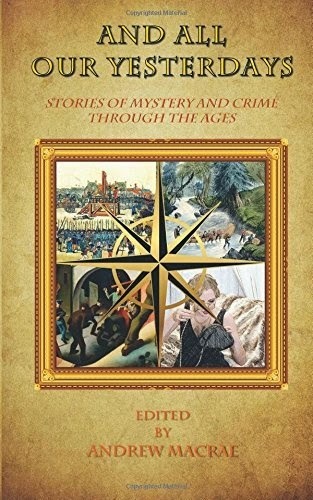
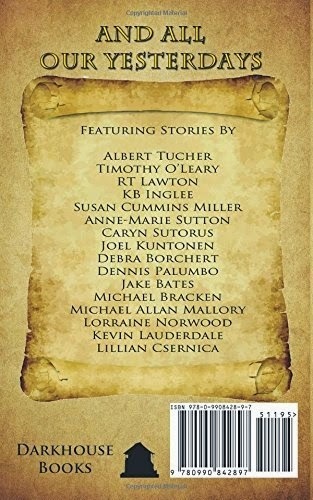
Published on March 18, 2015 15:02
March 17, 2015
Sneek Peek at Dr. Fuddle's Epic Journey to Earth!
Published on March 17, 2015 10:17
March 9, 2015
The Picture Kills review and meet and greet with author Ian Bull
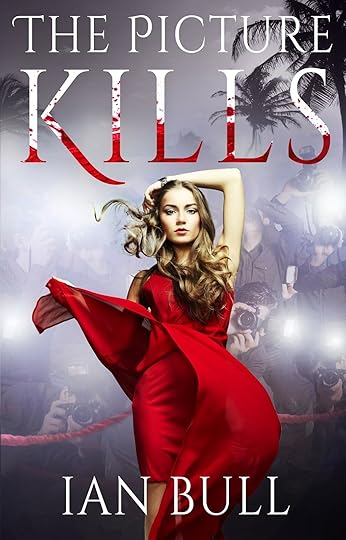 Rating: 4 of 5 stars
Rating: 4 of 5 starsSince the war, Steven Quintana has been running from his past. He decides to fill the hole in his heart by using his talent for photography to take pictures of celebrities. This backfires when a photo he has taken is used to cover up a kidnapping. He is then compelled to rescue the victim. Does he succeed or does he die trying? You will just have to read this compelling thriller novel to find out.
I found this book to be a wonderful suspense novel filled with action, drama, loyalty, and humor. The plot is fast paced and flows well. I especially like when he starts naming the bad guys I was chuckling the whole time. I would recommend this to anyone who likes thrillers, dramas, or a dangerous rescue of a damsel in distress.

Who are you and what do you do?
My name is Donald Ian Bull, and my pen name is Ian Bull. I am a husband and a father, I live in Los Angeles, and I grew up in San Francisco. I have been a TV writer, director and producer. Now I edit TV shows and write novels, screenplays and my blog, CaliforniaBull.
What genre do you like to write?
I like to write thrillers, but with strong female characters. Some people have said I write romantic thrillers, or thrillers with romance, if there is such a thing. I’ve only published one book so far, so it may change.
If you were to branch out from your current genre which one(s) would you like to explore?
I’d write historical fiction, or historical recreations/examinations. I love reading about the past.
How long have you been writing? What prompted you to start writing?
I have been writing since I was ten. I’ve always wanted to write novels, but the truth is, I didn’t have the courage to pursue it. I chose a “sensible” path that led to writing news for TV, that led to documentaries, that led to TV writing, and screenplays. Perhaps I also have enough life experience now to tackle a novel.
What inspires you to write?
I have imaginary conversations in my head all the time (in a good way), always arguing two sides of a conflict. I am also inspired by my own mortality, the problems in the world. Those drive me to act. My family also inspires me, in a positive way..
When a story idea pops into your head, how long does it typically take to write it (from start to finish)?
Years. That’s because I am writing two hours a day (three on weekends) while also earning money as a TV editor working eight to ten hours a day, and also being a husband and father. I wish I could flop it and edit two hours a day and write for eight!
What did you find to be the most difficult part of the writing process? Easiest?
The hardest part of writing for me is when I paint myself into a corner with a plot point or a character’s behavior and I realize I must back track and fix it. The easiest part for me is to rewrite and edit my first draft. I don’t find that difficult, because I do it all day with my TV footage.
Of all your characters whom do you most relate to?
The main character Steven. He’s great at what he does, yet he knows he could be doing more, yet is plagued by doubt. That’s me…and plenty of other people! I’d like to be like Carl Webb, but I’m not.
Is there one of your characters that you did not like when you started writing about them, but found yourself liking by the end of the story?
Trishelle. I first made her ditzy, and then my wife pointed out that women have friends for a reason — they compliment each other and support each other, even if they’re very different, and Julia wouldn’t have a one-sided friendship. She’d have a friend as strong and smart as her, but in a different way. I went back and made Trishelle strong and capable in her own way, with her own vision of the world that is different than Julia’s. She’s much more street smart and savvy about the ways of the world than Julia is, especially when it comes to politics and men.
What is your least favorite part about writing? The Most?
My least favorite part of writing is fighting to find the time to write. My favorite part of writing is finishing a chapter and then telling my wife.
When you are not writing or editing what do you do for relaxation?
I read, I swim, I play with my daughter, hike with my wife and cook.
What genre of books do you like to read?
I like thrillers, histories, dramatic histories, and contemporary fiction.
What author(s) do you enjoy reading? Why?
I go on kicks. Right now I am reading Karen Russell, who wrote Swamplandia, Vampires in the Lemon Grove and Sleep Donation. I am also reading This Changes Everything, by Naomi Klein about Climate Change. I also love anything by T.C. Boyle and Steinbeck, my favorite California writers. For thrillers, I like John D. MacDonald — old school.
Tell us about your books where can people find them?
THE PICTURE KILLS, is available on Amazon, in print and digital formats. The sequel, SIX PASSENGERS, FIVE PARACHUTES, will be out in 2015!
Ian Bull is the pen name of Donald Ian Bull, a TV producer and director turned thriller novelist. His TV credits include The Real World, The Osbournes, and Dr.90210. He grew up in San Francisco, attended UC Berkeley and then UCLA, and now lives in Los Angeles with his wife and daughter.
Reposted from Sally Wolf Reads
Published on March 09, 2015 14:44





